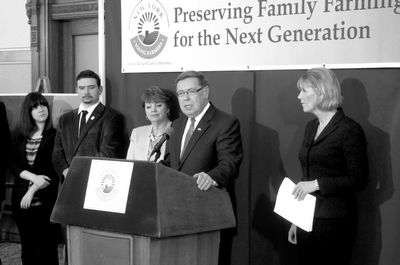Subscriptions
Menu
Advertisements
State Senate unveils plan for Young Farmers
3/18/2014 |

State Senator James Seward has joined Senate colleagues in unveiling the "Young Farmers NY" plan to address issues related to the advancing age of New York farmers and to preserve the future of family farming.
The initiative will support and encourage a new generation of farmers and help strengthen the state's leading industry for decades to come.
"New high tech industries emerge every day, but agriculture persists as New York's economic, social, and environmental binding force," said Senator Seward.
"Helping our next generation of farmers contend with industry-specific hurdles - education, property taxes, and equipment costs - will boost our state's economy and sow the seeds for future growth of our number one industry."
"Young Farmers NY," which was announced last week at a Capitol news conference, is a series of proposals to smooth the transfer of farmland to the next generation, preserve existing farmland, and help young farmers overcome obstacles to give them a greater opportunity for a successful career in agriculture.
The Senate plan is in response to research that shows the average age of New York farmers is increasing, as fewer young people pursue farming careers.
According to new data from the USDA Census of Agriculture, the average age of New York farmers is now 57.1 years.
There are two farmers aged 65 and older for each one under age 35.
This and other factors lead to farmland being lost forever to development.
About 50,000 acres of farmland were lost in New York in each of the last five years, the federal agency reported.
"Young Farmers NY" addresses these problems in two ways, by helping to encourage more young people to consider a farming career, and by reducing financial roadblocks to starting a new agriculture business.
The plan calls for a state investment of more than $30 million.
"Farms are very often a family business. We want to make sure that fathers, mothers, and grandparents are able to pass that business down to the next generation. To do that, we need to address the high costs associated with the profession and help ready our young farmers so they can succeed in an evolving economy," Senator Seward added.
Highlights of "Young Farmers NY," which will be included in the Senate's budget resolution include:
•Loans, grants, and tax credits for the sale or lease of land and equipment, as well as for new technological innovations.
•Estate tax reforms to encourage farm preservation from generation to generation.
•Agricultural education efforts including an apprenticeship program, student loan forgiveness, and increased funding for the in-school Future Farmers of America (FFA) program.
Dean Norton, president of New York Farm Bureau said, "As the average age of farmers grows each year, it's important to encourage and promote the development of the young farmer community."
"This plan is designed to not only help young farmers that are already involved in agriculture, but to get more young people involved in farming. New York Farm Bureau thanks the Senate Republican conference for their work to ensure that New York State agriculture remains the state's top industry" Mr. Norton said.
Additional details of the "Young Farmers NY" plan include:
Land ownership
The biggest single obstacle to starting a farm business is the high cost of land, equipment, and supplies for starting farmers. Long-time farmers face pressure to sell to developers for higher prices than can be gained from keeping land in farming, lenders can be wary of extending credit to untested new farmers, and the state's tax code makes it difficult for farmers to pass on their business to the next generation. Young Farmers NY seeks to help prospective farmers overcome these obstacles.
•Young Farmer Farm Preservation Tax Credit: Provides eligible farmers with up to 10 percent of the sale or rental price for the sale or lease of land or equipment to a new farmer. This preserves farmland, allows retiring farmers a more equitable return on their lifelong investment, and lowers the cost of farmland for beginning farmers. ($5 million)
•Young Farmer Revolving Loan Fund: Provides $5 million for start-up loans for land and equipment purchases by new farmers. ($5 million)
•Young Farmer Innovation Grants: Allocates up to $50,000 for new farmers through a competitive grant program that seeks to encourage new technology or production innovation. ($1 million)
•Farm Savings Accounts: Establishes savings accounts similar to college or retirement accounts. Savings intended for the purchase of farmland or equipment would grow tax-free. ($5 million)
•Estate Tax Reform: Increases the estate tax exemption and lower rates as proposed in the Executive Budget ($14 million)
Agriculture education
Just as many other successful industries, modern farming relies on technology and cutting-edge information to improve production, cut costs, and boost profits. Young Farmers NY includes:
•Young Farmer Apprenticeship Program: Provides funding to BOCES programs to establish partnerships with real working farmers to help young people gain hands-on experience they can bring to their own successful farm operation. ($500,000)
•Young Farmer Student Loan Forgiveness Program: Directs the Board of Regents to establish a student loan forgiveness program for up to 10 agriculture degree graduates who agree to work full-time in agriculture a minimum of five years. ($100,000)
•Funding for Agriculture Education: Increases funding for the in-school FFA program, which encourages careers in agriculture. There are 77 FFA chapters in New York, including in New York City. ($158,000)









